Argument from inconsistent revelations facts for kids
The Argument from Inconsistent Revelations is an idea that questions whether God exists. It looks at the many different religions in the world. Many religions are based on special messages or "revelations" that people believe came from God. The problem is that these messages often disagree with each other. If someone chooses to believe one religion's message, they are usually rejecting the messages of other religions. This idea suggests that because these revelations are so different, it makes it hard to know which, if any, is true.
Christians believe that Jesus is the savior of the world and the son of God. Jews, however, believe strongly that he is not. Similarly, Muslims believe that the Qur'an was written by God. Jews and Christians do not believe this. There are many examples of such different views. It is common for one religion to disagree with another. Even within Christianity, there are many denominations that do not agree on everything.
Contents
What is the Argument from Inconsistent Revelations?
This argument points out that many religions claim to have special knowledge from God. This knowledge often comes through prophets, holy books, or special events. These are called "revelations." The argument highlights that these revelations often tell very different stories. They might have different rules, different ideas about God, or different ideas about what happens after death.
Why do revelations contradict each other?
Imagine many people claiming to have a secret message from the same person. But each message says something totally different. This is similar to how different religious revelations can be. For example, one religion might say there is only one God. Another might say there are many gods. Some religions believe in reincarnation, while others believe in a heaven and hell. These ideas cannot all be true at the same time.
How do people choose a religion?
When someone chooses a religion, they are often accepting its revelations as true. This means they are also saying that the conflicting revelations from other religions are not true. For example, if you believe in the Christian idea of Jesus, you are not believing the Jewish idea that he is not the Messiah. This choice often relies on what a person is taught or what their community believes.
Different Beliefs Around the World
The world has many religions and spiritual paths. Each one offers a unique way of understanding life, God, and the universe.
Examples of differing religious views
- God's Nature: Some religions, like Christianity, Islam, and Judaism, believe in one God. This is called monotheism. Other religions, like ancient Greek or Roman religions, believed in many gods. This is called polytheism.
- Holy Books: Christians have the Bible. Muslims have the Qur'an. Hindus have the Vedas. Each book contains different stories, laws, and teachings.
- Afterlife: Some religions teach about reincarnation, where a soul is reborn into a new body. Others teach about a single life followed by an afterlife in heaven or hell.
- Prophets and Leaders: Different religions follow different prophets or spiritual leaders. For example, Christians follow Jesus, Muslims follow Muhammad, and Buddhists follow Siddhartha Gautama (the Buddha).
What happens when beliefs clash?
When religious beliefs clash, it can lead to questions about which path is correct. The Argument from Inconsistent Revelations suggests that the existence of so many conflicting claims makes it less likely that any single one is truly from God. It encourages people to think critically about religious claims.
Images for kids
-
Catholic church, Mosque and Serbian Orthodox Church in Bosanska Krupa, Bosnia and Herzegovina
-
Congress of Parliament of the World's Religions, Chicago, 1893
-
Front page of the 1555 Peace of Augsburg, which recognized two different churches in the Holy Roman Empire.
See also
 In Spanish: Argumento de las revelaciones inconsistentes para niños
In Spanish: Argumento de las revelaciones inconsistentes para niños
 | Lonnie Johnson |
 | Granville Woods |
 | Lewis Howard Latimer |
 | James West |







